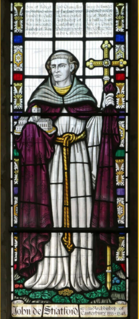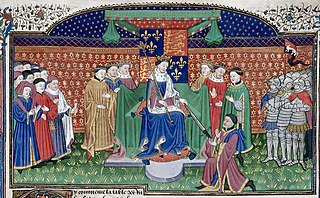Walter Reynolds was Bishop of Worcester and then Archbishop of Canterbury (1313–1327) as well as Lord High Treasurer and Lord Chancellor.

John de Stratford was Archbishop of Canterbury, Bishop of Winchester, Treasurer and Chancellor of England.

John Kemp was a medieval English cardinal, Archbishop of Canterbury, and Lord Chancellor of England.
William of Wykeham was Bishop of Winchester and Chancellor of England. He founded New College, Oxford, and New College School in 1379, and founded Winchester College in 1382. He was also the clerk of works when much of Windsor Castle was built.

Thomas Rotherham, also known as Thomas (Scot) de Rotherham, was an English cleric and statesman. He served as bishop of several dioceses, most notably as Archbishop of York and, on two occasions as Lord Chancellor. He is considered a venerable figure in Rotherham, South Yorkshire, his town of birth.
Robert Stillington was Bishop of Bath and Wells (1465–1491) and a courtier under Edward IV of England. He twice served as Edward's Lord Chancellor and in 1483, he was instrumental in the accession of Richard III, leading to later reprisals against him under Henry VII.

John Stafford was a medieval English prelate and statesman who served as Lord Chancellor (1432–1450) and as Archbishop of Canterbury (1443–1452).

William Melton was the 43rd Archbishop of York (1317–1340).
Simon Islip was an English prelate. He served as Archbishop of Canterbury between 1349 and 1366.
Thomas Charlton was Bishop of Hereford, Lord High Treasurer of England, Lord Privy Seal, and Lord Chancellor of Ireland. He is buried in Hereford Cathedral in Hereford, Herefordshire, England.
John of Thoresby was an English clergyman and politician, who was Bishop of St David's, then Bishop of Worcester and finally Archbishop of York. He was Lord Chancellor of England under King Edward III starting from 1349.

Lawrence Booth served as Prince-Bishop of Durham and Lord Chancellor of England, before being appointed Archbishop of York.
Thomas Langley was an English prelate who held high ecclesiastical and political offices in the early to mid-15th century. He was Dean of York, Bishop of Durham, twice Lord Chancellor of England to three kings, and a Pseudocardinal. In turn Keeper of the King's signet and Keeper of the Privy Seal before becoming de facto England's first Foreign Secretary. He was the second longest serving Chancellor of the Middle Ages.
Robert Baldock was the Lord Privy Seal and Lord Chancellor of England, during the reign of King Edward II of England.
Events from the 1340s in England
John Russell was an English Bishop of Rochester and bishop of Lincoln and Lord Chancellor.

Edmund Stafford was Bishop of Exeter from 1395 to his death in 1419.

John Bokyngham was a medieval treasury official and Bishop of Lincoln.
William Ayermin was a medieval Bishop of Norwich.








